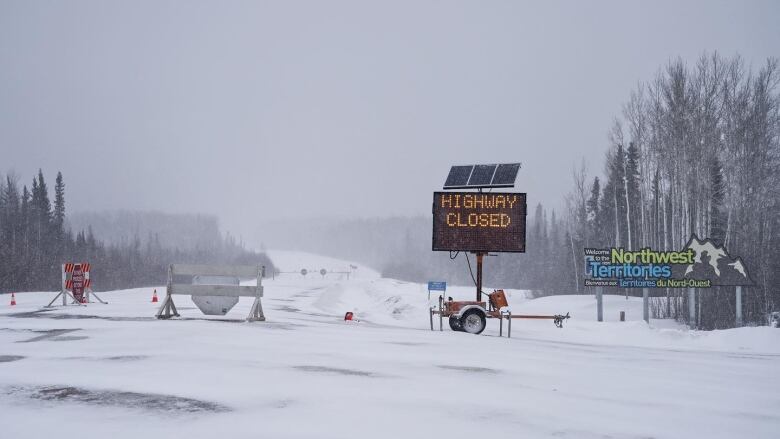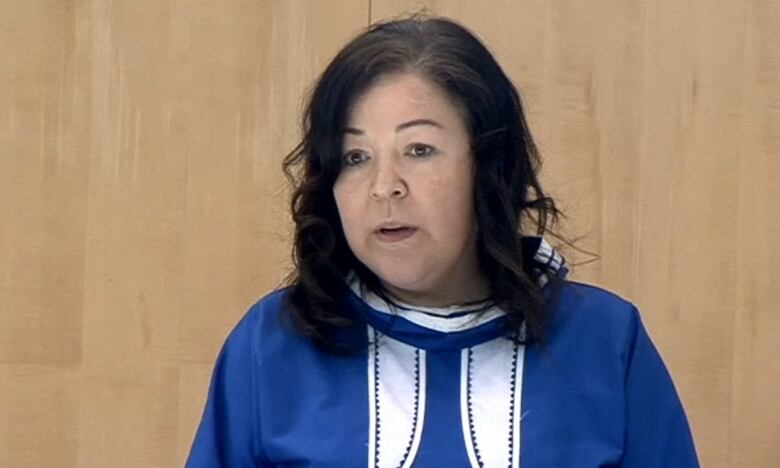What we know, and what we don't, about N.W.T.'s changing travel restrictions
After a confusing week, we sort through the information to give you what you need

Five words from Northwest TerritoriesPremier Caroline Cochrane this week contradicted months of government messaging on the N.W.T. border, setting off a firestorm of confusion that still hasn't been completely snuffed out.
"Tourism is on the table," she said.
With that,the territory abruptly changed course on its border restrictions, admitting its previous order was too broad and could violate the Canadian Charter of Rights and Freedoms.In fact, its policy changed May 29.
Since Tuesday, CBC News has tried to get an interview with either Cochrane, Chief Public Health Officer Dr. Kami Kandola, Conrad Baetz, the deputy minister responsible for COVID-19 enforcement, or any other government representative none have been made available yet.
-
Read more about how we got to this point.
With that in mind, we've broken down the government's statements to the media and in the Legislative Assembly to lay out what we know, what we don't, and questions we still want to ask.
What we know
Who's allowed into the Northwest Territories?
All Canadians are allowed into the territory, but there isn't much they can do once they get here, according to the latest media statement from Cochrane, Thom and Kandola, released Wednesday.
It says travel restrictions are "a legitimate and necessary measure" and territorial officials do not have the right to keep Canadians out. But they can restrict your movement once you cross the border, which they're still doing.
If the travellers don't already fit into an essential services category, they'll need to apply for an "exceptional exemption" to continue into the territory. We'll get to those exemptionslater.
What can they see and do when they cross the border?
Border checkpoints that were set up over the springare still in place. Travellers will need to check in with the border officers there, giving them their travel information and plans.
Travellers need to prove they fit within one of the exemption categories, and have a completed and approved self-isolation plan, as necessary.
If they don't like the travel restrictions, they can turn back around and head home.
What will they need to do if they decide to stay?
If they don't meet one of the essential services exemptions, they'll be told they need to apply for an exemption and self-isolate for 14 days.
The territory will continue covering self-isolation costs for returning residents.Non-residents have to pay the cost of isolating in one of four centres, either Hay River, Yellowknife, Fort Smith or Inuvik, Thom said Wednesday in the Legislative Assembly.
What are "exceptional exemptions," "statutory declarations" and how do you get one?
An exceptional circumstances exemption is when someone doesn't fall into one of the defined exemptions under the public health orders, but the chief public health officer has made an exception based on theirapplication to Protect NWT, explained Mike Westwick, the manager of the government's COVID-19 related communications.
Once a ruling has been made, the traveller will be notified and told about the self-isolation steps they'll need to take.
A statutory declaration is a signed and notarized letter that states a person's intention to live in the Northwest Territories, it can be used as part of the documentation provided in the residential self-isolation plan.

On Thursday, Thom was asked about family reunification exemptions in the Legislative Assembly, she said travellers should contact the government's Protect NWThotline to learn about applying for an exemption.
The expected wait time to hear back varies, Thom said, but travellers should expect a five-to-10 day delay.
"I ask residents and people planning to come to the Northwest Territories to plan ahead," Thom said. "You can't expect to just file a self-isolation plan and expect to know in a day-or-two, it does take time you should file your plan as soon as you know."
What should I tell friends and family looking for an exemption?
Apply with Protect NWTand let them know about the circumstances, Westwick explained. For example, if you're looking for a family reunification exemption, let them know if it's for compassionate reasons, like an illness.
It's up to the chief public health official to make a decision based on each situation and whether there's a public health risk for letting someone in. One important factor will be the COVID-19 situation where the traveller is coming from, how bad the outbreak is there.
Once she's taken in all the info, she'll make a decision on whether to grant the exemption.
What will visitors need to do to travel freely in the territory?
First, the exceptional circumstances exemption needs to be approved, if not, travelling within the territory would be an offence and you could be ticketed.Most travellers will then need to complete the 14-day isolation process in one of those regional centres before they can travel freely.
What happens if I try to cross the border and enter an N.W.T. community without permission?
As a public health order, people breaking the border restrictions are subject to discipline from the territory's COVID-19 enforcement squad. So far all but one interaction has resulted in either verbal or written warnings.
Twenty-seven people have been turned around at checkpoints this spring, since the health order came into place, Westwick said.
On Thursday, the territory issued its first ticket to a traveller who broke a health order, an Alberta driver who allegedly sped through the checkpoint in an unregistered, uninsured vehicle, according to RCMP and the territory's enforcement division.
The driver was ordered to pay $1,725 and they were taken back to High Level, Alta.
What we can't answer
For how long will these procedures be in place?
For the past three months, Dr. Kandola said border restrictions would be in place for the long haul. In the territory's Emerging Wisely plan travel restrictions are listed as "long-term measures" that would be among the last health restrictions lifted likely until after a vaccine is available.

Some changes are expected to be announced Friday, but Westwick said not much will change in practice at the checkpoints, officers will be there, taking information and making sure travellers are following the health orders.
What we're still asking
Why didn't the public learn about the changes when they came into effect on May 29?
This remains a mystery.
In the Legislative Assembly Wednesday, Thom admitted to a communication breakdown but it remains unclear what happened.
When questioned by MLA Julie Green, Thom's answer suggested government ministers were only made aware of the change after the fact too.
"Yes, I agree it's taken some time for us to communicate that, but as soon as we did find out within our cabinet, that's what we did," Thom said.
She added that going forward the government is putting a new communication plan to ensure "there is a process before it gets out into the public," but didn't say what that would be.
Who's calling the shots?
It also remains unclear where the direction to change the travel restrictions came from.
Throughout the pandemic response, Premier Cochrane and Health Minister Thom said they're deferring to Dr. Kandola, the chief public health officer when it comes to making public health decisions.
But so far, Kandola has not said anything about what happened this week, apart from Wednesday's statement, attributed to all three.
No one has taken responsibility for why this development was communicated inthis manner, when or how the governmentbecame aware the orders could contravene the Charter of Rights and Freedoms and how it went about bringing that change into effect.












_(720p).jpg)


 OFFICIAL HD MUSIC VIDEO.jpg)
.jpg)



























































































